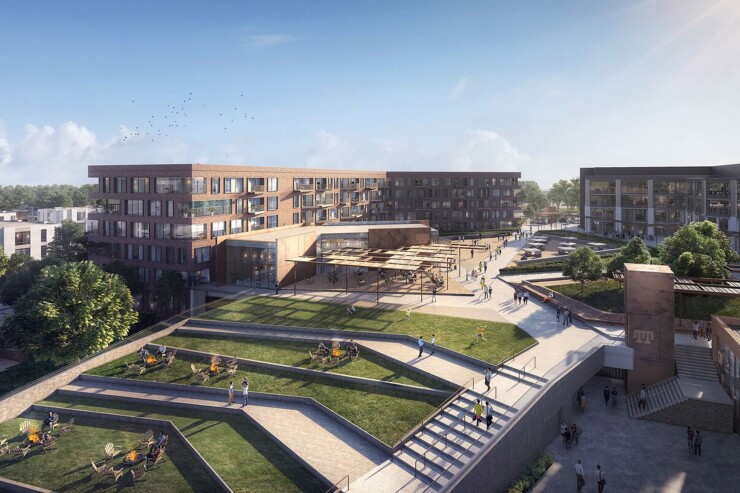Mark Murphy watched his Packers defeat the Buffalo Bills at Green Bay on Sunday, then by Monday the team's top executive was turning from helmets to hardhats, getting ready to unveil the next piece of the team’s real estate project next door.
The Packers plan to build more than 200 homes, with as many as 150 rentals and 90 for sale, a block from legendary Lambeau Field. The homes are the second phase of a mixed-use project called Titletown that already features a hotel managed by Kohler Co., a brewpub, a sports medicine center and a tech innovation lab that’s a joint venture with Microsoft Corp. The project will give a boost to the local economy, the smallest in U.S. professional sports, and the team’s bottom line, while giving millennials new places to live and work — and root for the team.
"We want to make sure Green Bay can have a strong enough economy to have an NFL team," Murphy, the chief executive officer of Green Bay Packers Inc., said in an interview. "If we can do things to make Green Bay more attractive, not just to visitors, but make more people want to come and work in Green Bay, we'd consider that a success."

Sports franchises are jumping into property development, building entertainment districts around their ballparks and arenas to give fans more ways to spend money. While revenue from broadcast contracts and ticket sales are often subject to revenue sharing between teams, real estate proceeds flow directly into the team's coffers.
"These projects exemplify these professional sports as an industry is changing," said Jeffrey O'Brien, a real estate attorney at Chestnut Cambronne in Minneapolis. Big screen televisions and social media have made it easy for fans to engage from the comfort of their livings rooms, "so you need to make basically a destination out of the facilities."
For Green Bay, the development also helps monetize the team's most valuable asset — the "Cheeseheads," among the most passionate fans in football. They're known to wear fake cheese hats, paint their faces and bodies yellow, green and white and go shirtless in subzero temperatures. Despite playing in the league's smallest market, the team is routinely in the top 10 in local revenue generated. Green Bay has sold out its season tickets in every season since 1960, and the waiting list is now over 130,000 people long.
Packers fans take summer pilgrimages to Lambeau Field, named for team founder, player and coach Curly Lambeau. The biggest event of the offseason is the team’s Hall of Fame weekend, with a sold-out banquet inside the stadium for fans and former players. When quarterback Brett Favre was inducted in 2016, it took less than a day to sell all 67,000 tickets. The stadium is also popular for weddings, bridal showers and bachelor parties.
Green Bay is on well-trod ground, following sports franchises around the country in branching out into real estate.
The Dallas Cowboys recently moved their headquarters and practice facility into a $1.5 billion development in Frisco, Texas, combining the usual trappings — a hotel and a shopping mall — with a 300,000 square-foot medical center. In September, the San Francisco Giants announced a partnership with Tishman-Speyer Properties to build a mixed-use project that calls for 1,400 residential units, 1.4 million square feet of office space and the rehabilitation of a historic pier.
In Atlanta, the Braves are building an office tower that will house the Americas headquarters for the German elevator manufacturer Thyssenkrupp Elevator. And the Boston Red Sox baseball team recently proposed building a 5,000-seat event venue with concert promoter Live Nation Entertainment Inc.
The big-market teams are building in markets where rents are already soaring. Since 2011, San Francisco's average rent has jumped 47 percent to $4,205, according to Zillow data on apartments and other rental properties. Atlanta, which opened the Braves SunTrust Park last year, sees rent that averages $1,537, up 29% from the start of the decade.
Green Bay's Titletown is small cheese compared with most of those projects, but the Packers are different from those franchises in key ways.
About 300,000 people live in the Green Bay metropolitan area, making it about a quarter of the size of the league's next-smallest markets. The median price for an existing single-family home there was $181,800 in the second quarter, up 11% from a year earlier, data from the National Association of Realtors show, while the typical rental goes for about $900 a month, according to Zillow.
Unlike other teams, the Packers are controlled by a private nonprofit. While the team is publicly owned, the "shares" don’t pay dividends or appreciate in value, and can't be resold. That hasn't stopped fans from opening their wallets when given the opportunity. The last stock issuance, back in 2011, added 250,000 shareholders and raised $64 million.
Overall, investment in Titletown is expected to exceed $300 million, including $70 million on residential. So far the Packers and their partners have spent $120 million, with $74 million coming directly from the franchise, a sizable chunk of change in the Packers' corner of northeast Wisconsin, where money goes further than in bigger markets.
Murphy said it’s too early to say how they’ll price the units but envisions the for-sale units as second homes for Packers fans across the country, while the rentals will be aimed at college grads and young professionals who want a more urban feel than they can find in Green Bay's suburban neighborhoods.
"On game day, everything does well here," said Murphy. "The question is the rest of the year. Can you still maintain it?"




